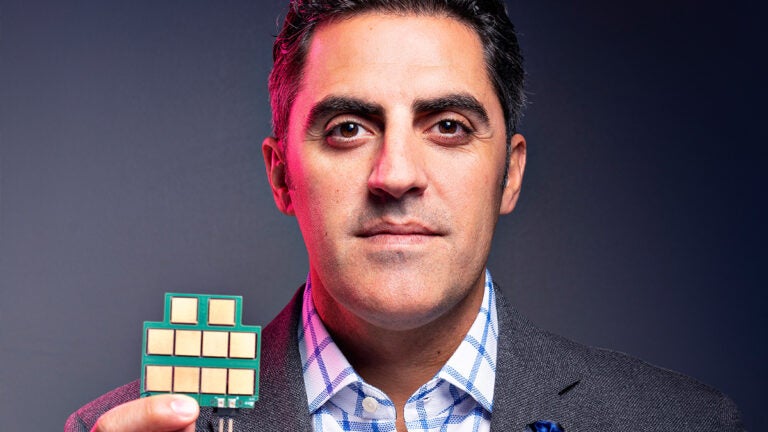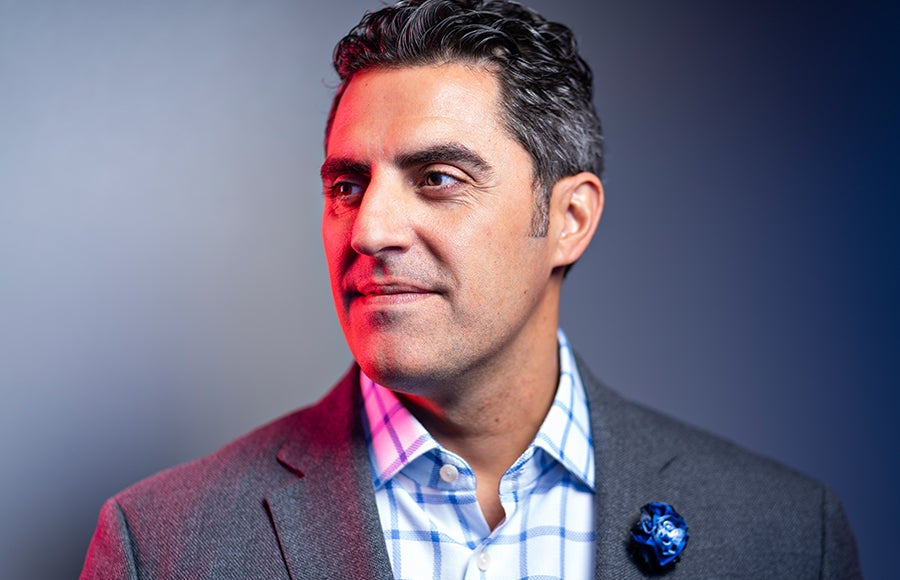
Dr. Cool
You know the clunky, old-fashioned technology that keeps your food cold and your home heated? Tony Atti has a high-tech, environmentally friendly solution to replace it that fits in a chip the size of your fingernail.
The USC Dornsife alumnus is the CEO of Phononic, the company he co-founded to advance this thermoelectric technology. Named after a phonon, the basic particle of heat, Phononic is poised to upend the $30 billion-a-year market for compressor-based cooling.
Here’s an example. Say you drop by a convenience store to grab a cold soda or a carton of milk. Typically, you’ll head to the large refrigerators in the back of the store to select your beverage.
While you’re choosing between cola and iced tea, what may not occur to you is the reason for the refrigerators’ size and location: The compressors that make them run have significant energy needs that require special electrical connections and a large amount of space to contain and ventilate their machinery.
A typical refrigerator uses a compressor to circulate a liquid refrigerant like Freon, which sets off a series of thermo-dynamic changes through a system of coils and condensers, creating cold by removing heat and transferring it elsewhere.
Now imagine a small refrigerated box, a little bigger than a microwave oven, that is cooled using a thermoelectric chip, which creates cold by moving heat from one side of the chip to the other, a process known as solid-state technology. Using about 30 percent less energy and without toxic refrigerants, it can be placed on a checkout counter where customers can grab drinks, ice cream bars or other cold fare at the point-of-sale.
Phononic has already put these countertop freezers in stores around the country for a major food and beverage retailer, merchandising several ice cream brands. Atti’s company is also attracting clients in health care, fiber-optic communications and climate-control markets — an area that’s becoming increasingly important as global temperatures rise.
While these opportunities are incredibly exciting, it hasn’t been easy, Atti admits. Bringing a potentially game-changing technology to market and going up against a 200-year-old incumbent has been “backbreaking work,” he says.
“It’s romantic to talk about disruptive companies. But you’ll find every obstacle in your way to prevent change.”
So far, Phononic has been able to make meaningful inroads in diverse markets. This is largely thanks to Atti, whose scientific knowledge and dedicated focus has pushed thermoelectric cooling and heating technology to an exciting turning point that could revolutionize the way we make things hot or cold, while substantially improving sustainability.
Go west, young man
Atti’s entrepreneurial spirit has deep roots. He jumped feet first into the working world as a young boy delivering newspapers in his Buffalo, New York, neighborhood.
“That area of the state has a reputation for being a blue-collar, very hard-working town,” he says. “It’s something that I’ll take with me throughout my life.”
Now 45 and living in Durham, North Carolina, with his wife and three children, he keeps a piece of a wagon used to pull papers from house to house mounted on his wall as a reminder of his work ethic — and to inspire his kids.
“I tell them all the time about what I did ‘back in my day,’” Atti says with a laugh.
Friendly and charismatic, he’s as relaxed chatting about Phononic’s thermoelectric technology in a television interview as he is in a one-on-one conversation.
That’s because in addition to having the business acumen needed to run the company, he’s also extremely comfortable explaining the science behind the technology. Atti earned a Ph.D. in chemistry from USC Dornsife in 2000, an unexpected twist in what started out as a very specific — and very different — career plan.
Atti is the eldest of three siblings in what he characterizes as a “pretty large, fun and loud Italian American family.” His father, now retired, sold insurance and his mother is a nurse. She still practices. Because of his mother’s career, Atti spent a lot of time around medical professionals. Entering college, he was determined to become a doctor.
He earned his undergraduate degree in biochemistry from Ithaca College, just a few hours from his hometown, and then shocked his family when he announced his plans to move across the country to Los Angeles to pursue a doctorate at USC Dornsife.
“Given the tight-knit nature of my family — my parents, my sisters, aunts, uncles — they were just blown away that I was crazy enough to move to California,” he says.
It hadn’t hurt that Atti’s initial campus visit took place in February — a beautiful time of year in L.A., but notoriously wintry in New York.
The decision had a profound influence on the trajectory of his life and his career.
“Quite honestly,” Atti says, “personally and professionally I’ve never been the same since.”
Clean energy pioneers
At USC, Atti went to work with renowned chemists G. K. Surya Prakash and George Olah, leaders of the USC Dornsife Loker Hydrocarbon Research Institute.
Olah won the 1994 Nobel Prize in chemistry for his groundbreaking work on superacids and his observations of a fleeting chemical species known as carbocations. Together with Prakash, the two pioneered the visionary concept for creating renewable energy sources known as the methanol economy, a model in which chemistry is used to produce methanol in place of fossil fuels for energy storage, fuel and feedstocks.
When researching Ph.D. programs, Atti had still been committed to the pursuit of medicine, but after talking to Olah and Prakash, he switched his plans and made synthetic, organic and polymer chemistry the focus of his research.
“They put the hard sell on me that it would have a much broader applicability in all areas of science, and be a smart way to approach my career,” he says. “It made sense to me.”
At USC Dornsife, Atti joined a high-profile research partnership between the institute and the NASA Jet Propulsion Laboratory. The effort looked at methanol-powered fuel cells. To be commercially viable, advances in performance and cost were necessary. Atti worked on developing chemistry — specifically, solid polymer electrolytes — with the right conversion efficiencies, and weight and cost benefits.
The program was very focused, disciplined and accelerated, Atti said. “It was a privilege for me to work on it. I was, and still am, unbelievably grateful.”
Something completely different
The methanol fuel cell program introduced Atti to the world of technology commercialization and how to take an idea from concept and research to market.

It also made him realize that venture capital and technology commercialization were his passions.
“Keep in mind this was the late ’90s, early 2000s — the dot-com era,” he says.
“In light of the opportunity to take incredible work done by others and bring it into the public or commercial domain, the thought of being a research scientist or taking a purely technical career path was just not for me.”
Though his career took him out of the lab and Olah passed away in 2017, Atti stays in touch with his former Ph.D. adviser Prakash to this day, stopping by the Loker Institute when he’s in L.A.
Atti has also returned to USC Dornsife to address students at a career symposium. “They were highly inspired by his talk,” notes Prakash, George A. and Judith A. Olah Nobel Laureate Chair in Hydrocarbon Chemistry and professor of chemistry.
The Trojan Family continues to be an important part of Atti’s professional life. He’s tapped into the university network throughout the years, but a current collaboration with a fellow former member of the Loker Institute exemplifies the tremendous value of the worldwide network of alumni.
Tim Londergan, who earned his Ph.D. in chemistry in 1998 from USC Dornsife, has spent years as an entrepreneur specializing in technology licensing. Now, his firm, Wavefront Venture Partners, is helping Phononic launch its climate control program in Singapore.
“Entrepreneurship can be a lonely journey — the Trojan Family shows that doesn’t have to be the case,” Atti says.
Back to the future
In his early years as a venture capitalist, Atti found that his counterparts were reluctant to go to universities to talk to academics because they didn’t understand the culture.
It was an environment in which Atti, of course, was very comfortable. “That was my super power,” he says. “My experience at USC was essential to that professional ability.”
With thermoelectric technology, Atti has the opportunity to bring a whole new approach to two very basic challenges: How to keep things cool or make them hot.
Ironically, Phononic’s approach dates back nearly two centuries to its discovery by French physicist Jean Charles Athanase Peltier in 1834 — around the same time that vapor compressor technology was established.
But imperfections in the metals used at that time made the process, dubbed the Peltier effect, inefficient and unreliable. To find a solution for today’s world, Atti visited scholars at research universities around the country to learn how to make the technology commercially viable. In 2009, he brought a list of pitfalls, and the names of university partners who could address them, to his investor group.
“Quite literally the next day, two investors gave me a term sheet and Phononic was founded that afternoon.”
According to Atti, what makes solid state compelling is that without moving parts you have a complete inversion of the way cooling is conventionally provided.
“A vapor compression system uses a motor and mechanical parts along with toxic refrigerants that contribute to global warming to artificially create cold. It’s brute force, but it’s effective,” he says.
Phononic’s chip and subsystems function differently, pulling heat out of an appliance instead of pushing cold into the cabinet in the way that compressors operate. “You get a much more uniform, stable and responsive level of cooling that has superior performance and efficiencies,” he explains.
Atti believes his company is on the cusp of ushering in a new future in cooling and heating solutions — one that’s far more sustainable than the dated model we have depended on for so long.
The technology has already been adopted by network equipment manufacturers driving 5G cellular expansion. These users rely on the technology to cool fiber optic and wireless infrastructures — a process of tremendous importance. “If those optics and wireless components are not kept at a very careful temperature, there goes your data,” Atti notes.
A number of health care and pharmaceutical science companies have also adopted refrigerators and freezers that use Phononic’s technology to store drugs and vaccines in hospitals, clinics and pharmacies around the world.
But Atti sees the biggest potential for growth in the cooling market in Southeast Asia. Keeping things cold in this hot and humid part of the world — whether it’s products in transit or the temperature in someone’s home — is a challenge.
However, there are countless ways to reimagine how to address basic heating and cooling needs and potential new products with more sustainable, less toxic and more efficient technologies. Atti is up for the challenge. “There are an unbelievably eclectic group of markets dependent on a centuries-old technology, and their thermal needs tend to be very similar to one another,” he says. “We believe they’re reaching the tipping point where the incumbent solutions are no longer getting it done.”
Read more stories from USC Dornsife Magazine’s Spring/Summer 2020 issue >>